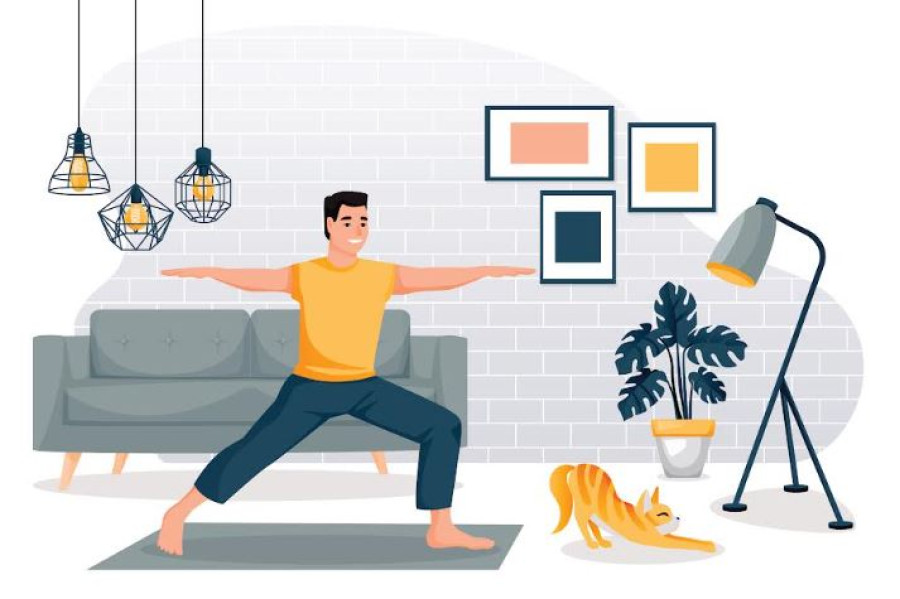Culture & Lifestyle
Staying mobile
Tekendra Thakuri discusses the importance of mobility for better movement and overall health.
Timila Maharjan
Tekendra Bahadur Shahi Thakuri, a trainer and coach at The Pump, came to appreciate mobility’s value and the significance of functional movements after a major knee surgery.
This realisation led to focusing on expertise in callisthenics (both bodyweight and weighted), functional training, body flow, and strength and conditioning.
How would you define mobility in the context of fitness and overall health?
Mobility refers to the body's ability to move efficiently and freely through a full range of motion without pain or restriction. It involves coordinating muscles, joints, and the nervous system, ensuring that movements are stable and controlled. Unlike flexibility, which is primarily about how far a muscle can stretch, mobility surrounds a combination of flexibility, joint health, muscle strength, and neuromuscular coordination.
How does mobility impact our daily lives outside of workouts or sports?
Mobility is an important quality of physical independence, comfort, and ease in everyday life. It enhances functional movements, reduces the risk of injuries, improves posture, and reduces joint pain, which results in relaxation and stress relief.
Why is maintaining mobility essential as we age?
Maintaining mobility supports rehabilitation and recovery, enhances confidence in movement, and promotes longevity and healthy ageing. It contributes to mental well-being, reduces the risk of falls, alleviates joint pain, and fosters independence.
Picture yourself in your 60s or 70s, not only playing but also lifting and carrying your grandkids easily—staying active makes it all possible.
How does mobility influence strength training, cardio, or sports performance?
Mobility is the foundation for best performance in strength training, cardio, and sports activities. It ensures that each movement is executed with efficiency, control, and safety, enabling you to push your limits while minimising the risk of injury. By enhancing lifting mechanics and optimising muscle activation, mobility helps you move more effectively, unleash your full potential, and achieve better results in every discipline.
What’s a common challenge people face with mobility training?
One common challenge is inconsistency. This often stems from a lack of understanding about its importance, limited time, or the misconception that mobility work is boring or unnecessary, leading to muscle stiffness. You must stay active and stick to any physical activities to overcome this. Regular training is a must.

What are some physical advantages of incorporating mobility exercises into one’s routine?
Incorporating mobility exercises into your routine is a game-changer for physical health. These exercises improve joint range of motion, enhance coordination and neuromuscular control, accelerate recovery, boost athletic performance, and elevate overall functional movement. By integrating mobility work, you move more efficiently and unlock your body’s potential for greater strength, resilience, and adaptability in daily life.
What are some mental health benefits associated with practising mobility exercises?
It promotes better sleep, builds resilience and confidence, boosts focus and concentration, enhances mind-body connection and encourages emotional release. You can nurture your body and mind by incorporating mobility work into your routine.
Do you want to debunk any myths or misconceptions about mobility training?
The main misconception about mobility training is that people believe it’s a type of physiotherapy needed when physical challenges arise.
How has focusing on mobility personally benefited you or your clients?
Building on these advantages, I realised the importance of deepening my understanding and practice of mobility and flow while sharing my expertise with clients to help them achieve healthier, more balanced lifestyles. Consistently practising mobility (at least 3-4 times a week) has made my joints, particularly my spine, stronger than ever. It has also proven effective in helping my clients alleviate joint pain.
Mobility is essential for everyone—it nurtures the body through movement and the mind through stillness.




 9.7°C Kathmandu
9.7°C Kathmandu

.jpg&w=200&height=120)













